|
|
|
Sort Order |
|
|
|
Items / Page
|
|
|
|
|
|
|
| Srl | Item |
| 1 |
ID:
127558
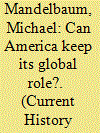

|
|
|
|
|
| Publication |
2014.
|
| Summary/Abstract |
Almost one hundred years ago events took place that propelled the United States on the path to the global role it plays today. World War I drew the country from the edge of international politics to the center. In 1917 America entered the war, dispatching troops to the European continent for the first time in its history. The United States withdrew from the security affairs of the continent during the interwar period, but returned in World War II, playing a larger role in Europe than in the previous conflict while simultaneously waging another major war, against Japan, in the Pacific.
|
|
|
|
|
|
|
|
|
|
|
|
|
|
|
|
| 2 |
ID:
127582
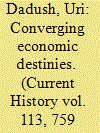

|
|
|
|
|
| Publication |
2014.
|
| Summary/Abstract |
The economic convergence of large parts of the developing world with the advanced nations is the great story of our time. Sixty years ago, Singapore was an impoverished, malaria-infested island whose future absolute ruler, Lee Kuan Yew, admired the prosperity and civilization of the United Kingdom, where he had been educated. Singapore's per capita income has since surpassed that of the UK and the rest of Europe by a wide margin and, more recently, that of the United States. Today, one in six households in Singapore has more than $1 million in disposable assets. And as its extraordinarily rapid economic development progressed, Singapore converged with the advanced nations in other ways: by rooting out endemic corruption, adopting strict environmental standards, and making progress toward a more pluralistic and democratic society.
|
|
|
|
|
|
|
|
|
|
|
|
|
|
|
|
| 3 |
ID:
127573
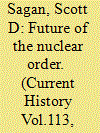

|
|
|
|
|
| Publication |
2014.
|
| Summary/Abstract |
Scholars should be modest when making predictions about the future of nuclear weapons. After all, pundits, professors, and presidents alike have made radically inaccurate nuclear predictions in the past. "In that terrible flash 10,000 miles away," the journalist James Reston wrote in The New York Times
immediately after Hiroshima and Nagasaki, "men here have not only seen the fate of Japan, but have glimpsed the future of America." A group of Manhattan Project scientists similarly argued, "The whole history of mankind teaches . . . that accumulated weapons of mass destruction 'go off' sooner or later, even if this means a senseless mutual destruction." Yet the United States has not used nuclear weapons in combat since 1945 despite many opportunities to do so during Cold War crises, in Korea and Vietnam, or during the 1991 Gulf War against Iraq.
|
|
|
|
|
|
|
|
|
|
|
|
|
|
|
|
| 4 |
ID:
127590


|
|
|
|
|
| Publication |
2014.
|
| Summary/Abstract |
Over the past 100 years, global demographic changes have been more than just historic - they have been so sweeping and profound as to rank almost on the scale of an evolutionary leap. What we have witnessed is nothing less than a departure from the demographic rhythms that previously characterized human existence. Across the world we have seen humanity unshackled from practically all the patterns and limits that bound us before, save for reproduction and death itself.
|
|
|
|
|
|
|
|
|
|
|
|
|
|
|
|
| 5 |
ID:
127588
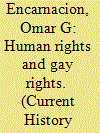

|
|
|
|
|
| Publication |
2014.
|
| Summary/Abstract |
When, many years from now, historians undertake to determine the watershed moments in the evolution of the international human rights movement, they likely will single out for attention the June 2011 United Nations Human Rights Council (UNHRC) resolution affirming that "gay rights are human rights." A simple fact underscores the resolution's momentousness: It has become common to think of gay rights and human rights as closely intertwined, yet the 1948 Universal Declaration of Human Rights-which asserted that human rights are inalienable rights that a person is entitled to simply because he or she is a human-made no mention of sexual identity, even as it addressed a wide range of rights, such as the right to work, housing, education, association, religion, and even leisure. So how did this commingling of human rights and gay rights come about, and what does it say about the future of both movements?
|
|
|
|
|
|
|
|
|
|
|
|
|
|
|
|
| 6 |
ID:
127571


|
|
|
|
|
| Publication |
2014.
|
| Summary/Abstract |
One of the notable trends of the past century that will likely continue to strongly influence global politics in this century is the current information revolution. And with this information revolution comes an increase in the role of soft power-the ability to obtain preferred outcomes by attraction and persuasion rather than coercion and payment. Information revolutions are not new-one can think back to the dramatic effects of Gutenberg's printing press in the sixteenth century. But today's information revolution is changing the nature of power and increasing its diffusion. Sometimes called "the third industrial revolution," the current transformation is based on rapid technological advances in computers and communications that in turn have led to extraordinary declines in the costs of creating, processing, transmitting, and searching for information
|
|
|
|
|
|
|
|
|
|
|
|
|
|
|
|
| 7 |
ID:
127589
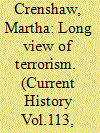

|
|
|
|
|
| Publication |
2014.
|
| Summary/Abstract |
Terrorism, a form of violence that deliberately rather than inadvertently targets civilians, should be understood as a process that evolves over long periods of time, rather than as a series of discrete events. This approach helps place the cataclysmic events of September 11, 2001, in comparative perspective. It also avoids the erroneous assumption that radical Islamism and terrorism are synonymous. From a long-term perspective, 9/11 marked neither a culmination of a trend nor a completely new phenomenon. Terrorism is not static-strategy adapts to circumstances and profits from technological advances; states take effective precautions; different ideologies and conditions motivate violence-but there are also important continuities.
|
|
|
|
|
|
|
|
|
|
|
|
|
|
|
|
| 8 |
ID:
127587


|
|
|
|
|
| Publication |
2014.
|
| Summary/Abstract |
In 2003, the investment firm Goldman Sachs predicted that, within less than 40 years, the economies of the so-called "BRIC" nations- Brazil, Russia, India, and China-could together exceed the output of America, Japan, Britain, Germany, France, and Italy combined, in US dollar terms. Since then, considerable hype has surrounded the BRIC phenomenon. Growth projections vary, and disputes have erupted between those claiming that the emerging markets will remain the powerhouses of the world and others pointing to a recent economic slowdown even in these countries. Arguments continue even about the category itself. Were the original BRIC countries right to expand their grouping to South Africa (creating the current BRICS)? Does Russia really deserve to be in it?
|
|
|
|
|
|
|
|
|
|
|
|
|
|
|
|
| 9 |
ID:
127562
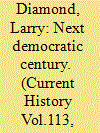

|
|
|
|
|
| Publication |
2014.
|
| Summary/Abstract |
This is an odd moment to predict a bright future for democracy. Despite the unprecedented expansion of political freedom during the three decades from 1974, democratic regimes are in trouble worldwide today. The past decade has witnessed democratic breakdowns at a growing pace, and levels of freedom have receded in many places. Autocrats are cooperating and innovating to preempt movements for democratic change. The world's oldest and most esteemed democracies, beginning with the United States, have lost their luster and (it seems) their capacity to function effectively to address their most important public policy challenges. Still, no other broadly legitimate form of government exists today, and authoritarian regimes face profound challenges and contradictions that they cannot resolve without ultimately moving toward democracy.
|
|
|
|
|
|
|
|
|
|
|
|
|
|
|
|
| 10 |
ID:
127570
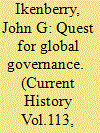

|
|
|
|
|
| Publication |
2014.
|
| Summary/Abstract |
One hundred years ago, the world unknowingly was months away from stumbling into the most violent era of war and political upheaval ever seen. It was a geopolitical and human disaster that lasted for decades-world wars, collapsed empires, communist revolution, economic depression, fascism, totalitarianism, genocide, atomic weapons, and the existential terror of the Cold War. As many as 200 million people lost their lives in this era to violence and deprivation. Hatred, insecurity, and despotism
proliferated on a global scale.
|
|
|
|
|
|
|
|
|
|
|
|
|
|
|
|
| 11 |
ID:
127585


|
|
|
|
|
| Publication |
2014.
|
| Summary/Abstract |
Since the middle of the twentieth century, the number and especially the severity of violent conflicts between and within states have declined markedly. This fact, seemingly counterintuitive, is becoming more widely recognized. In 2011, political scientist Joshua Goldstein's book Winning the War on War: The Decline of Armed Conflict Worldwide confirmed the trend starting after World War II. That same year, Harvard psychologist Steven Pinker's magisterial book The Better Angels of Our Nature: Why Violence Has Declined extended the overall trend-with various ups and downs along the way-as far back as human prehistory. The causes of the decline in armed conflict, meanwhile, are also becoming somewhat better understood.
|
|
|
|
|
|
|
|
|
|
|
|
|
|
|
|
| 12 |
ID:
127569


|
|
|
|
|
| Publication |
2014.
|
| Summary/Abstract |
Life in 1914 was by most measures a lot harder than it is in 2014 for the vast majority of the world's people. Without effective antibiotics and with only nascent knowledge of the causes of many diseases, stricken children and the vulnerable old had little hope of survival. The great influenza pandemic of 1918-19 killed some 50 million people worldwide. Polio mercilessly struck both rich and poor until vaccines were developed in the 1950s. At the dawn of the automobile age, cities were crowded and filthy, and long-distance travel was unreliable and slow. Refrigeration, enabling the delivery of food to distant markets and its preservation in the home, was still a distant prospect. In the public sphere as in the privacy of the family, women, half the global population, were woefully disenfranchised, as were ethnic minorities and indigenous peoples. They played no role in the decisions of state that were soon to convulse the so-called civilized world in an orgy of selfdestruction. Although independence movements were stirring in imperial territories, colonialism still bestrode large swaths of Asia and Africa, and political self-determination remained a dream.
|
|
|
|
|
|
|
|
|
|
|
|
|
|
|
|
|
|
|
|
|